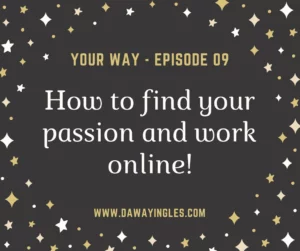
Cómo encontrar tu pasión y trabajar online. Sounds good, eh? Sounds like a dream come true, actually!
The question is, do you know that you can make it too? ¿Algua vez has pensado en trabajar desde casa, o quizá en encontrar esa pasión, algo que realmente te haga levantarte con ganas cada día? ¿Te gusta tu trabajo, te hace feliz?
That’s what one of our readers, Salas (Puerto Rico) was probably wondering when she sent the question. Hoy, Salas nos pregunta por este tema tan común hoy en día. Cómo encontrar tu pasión, cómo dar con una actividad que te haga sentirte realizado/a, feliz, que te aporte y te permita ganarte la vida con ello.
It’s a hard question, I admit! No soy ningún experto ni llevo años dedicándome a esto (apenas 2), pero sí que puedo decir que a día de hoy, llevo casi un año viviendo de los ingresos de este espacio, levantándome cada mañana con energía y ganas de ayudar a más y más gente a aprender inglés, y puedo realizar dicha labor desde cualquier lugar del mundo, sentado en un sofá (I am sitting while I write this article) o en un tren camino a Madrid, avión a Londres, etc.
I am very, very lucky, I know! And I feel grateful every single day. Cada día doy gracias por poder dedicarme a algo que me hace feliz, pero lo que me llena aún más, lo que me motiva a seguir aprendiendo y mejorando, es intentar, día tras día, ayudarte a ti a conseguir lo mismo, sea lo que sea que quieras conseguir gracias a mi trabajo: hablar inglés, viajar más, enseñar online, mejorar tu calidad de vida, vivir tus sueños, etc.
My mission, as usual, is that you learn English and have a good time, and that’s what Mónica and I will do in this brilliant episode! Ya sabes cómo funciona este podcast: hablamos en inglés sobre temas que te preocupan o interesan a ti, sobre cómo ayudarte a conseguir algo más que hablar el idioma, al tiempo que te proporcionamos toda la gramática y vocabulario usado en cada episodio, para que sigas el hilo y aprendas.
I’m 200% sure you will enjoy this podcast, we tried our best to help Salas and we hope we can help you too!
Cómo encontrar tu pasión y trabajar online – Your Way Episode 09
Usa este enlace para descargar el podcast en formato mp3
Ideas mentioned in this podcast
– Question of the day (from Salas, Puerto Rico): how to work from home and find what you love – 0:27
– How Mónica found her passion in writing a blog by accident. The best way to find the things that you love is to be in movement, doing things, trying – 02:25
– Tip 1: A passion is just a hobby if there is no market for it. You need to test your hobbies and see if there is a potential business (people interested, a problem to solve, etc). “Do your passion” is not good advice – 06:05
– Tip 02: Finding your passion is not something that happens one day, in your mind, most people don’t have a 200% clear idea of what their passion is, they just do things to be in movement and test – 08:17
– Tip 03: the process is not linear, you need to expect changes, variety, ups and downs. Try to find the sweet spot between what you love to do and what the market (people) need, their problems – 10:39
– Tip 04: Focus on values, not on specific jobs or tags. Why David loves helping people learn English although he doesn’t like grammar and vocabulary. You can apply your values to any job – 12:35
– Tip 5: Find a way to help people and their lives, focus on solving a problem. How Mónica learns from other people’s stories online, listening to real cases and how they did it. How hair extensions can be a business idea! – 13:50
– Tip 6: Your best or ideal customer is a person who is in the same situation where you were before, a person who had the same problem that you personally had and solved. Two websites that helped David a lot (in Spanish) – 21:21
– Tip 7: Ask yourself these two questions to find what you really love. A brilliant exercise to find what you enjoy doing. Try to ask people around you (family members, close friends, etc) – 22:45
– Tip 08: Try to keep your eyes open and remember that you can learn a lesson or find something interesting from every situation, no matter what. Mónica’s story about a writer who turned a brutal accident into an opportunity to find what he loved – 27:09
– Tip 09: Why quantity can be more important than quality, the importance of making a lot of experiments to find what you love or be successful. The story of the many vases! – 31:03
– Some general knowledge that can help you develop your online idea: wordpress, social media, email marketing, etc – 34:56
– The concept of “Just in Time learning”: why you only need to learn one thing at a time, when you really need it – 43:30
– Summary of the key points or takeaways of this episode – 48:29
Vocabulary used in this episode
– To struggle with something: tener problemas con algo, que te cueste algo
– Clarity: claridad
– Idealistic: idealista
– To move to another country/house: mudarse a otro país/casa, etc
– A passion: una pasión
– A mortal man/woman: un/a mortal
– To have no clue: no tener ni idea (clue: pista)
– To be passionate about something: estar apasionado o tener pasión por algo
– To work as a…: trabajar de/como…
– The syllabus of a course: el plan de estudios o programa de un curso
– To turn out to be…: resultar ser
– To be a risk: ser un riesgo
– To enjoy doing something: disfrutar haciendo algo
– To validate an idea: validar una idea, comprobar que funciona
– A fallacy: una falacia
– Movement: movimiento
– An engineer: un/a ingeniero/a
– To be lucky: tener suerte, ser afortunado/a
– Linear: lineal, predecible
– To expect to do something: esperar hacer algo
– The sweet spot: el punto medio ideal
– To solve a problem: solucionar un problema
– To have values: tener valores
– Unrelated: no relacionado
– To check around: echar un vistazo, mirar por ahí
– Something that resonates with you: algo que resuena, que te hace sentir identificado/a
– Middle-class: clase media
– Hair extensions: extensiones de pelo
– A hairdresser: un peluquero/a
– Make-up: maquillaje
– To showcase something: exhibir, mostrar, presentar algo
– What I like the most is…: lo que más me gusta es…
– To make a change: cambiar algo, hacer un cambio, marcar la diferencia
– To make an impression on someone: dar o causar una impresión en alguien
– What would you do…?: ¿qué harías…?
– To die: morir
– To be dead: estar muerto/a
– To do something on your own: hacer algo solo/a
– If it had happened/finished/started…: si hubiera o hubiese ocurrido/acabado/empezado…
– Behaviour: comportamiento
– To turn something into something else: convertir algo en otra cosa
– A vase: una vasija o jarrón
– To make an object: producir, fabricar, hacer un objeto
– A mark: una nota o valoración (académico)
– Shitty: de mala calidad, cutre
– Coding: código informático
– The learning curve: la curva de aprendizaje
– Steep: pronunciado, inclinado
– The boiler: el calentador (del agua)
– Gear: equipo (materiales, kit, etc)
– A prompter: un apuntador (aparato donde se escribe el texto a leer por un actor, persona grabando un vídeo, presentador, etc)
– To crash: quedarse colgado o congelado (un ordenador, aparato)
– To sum up: resumir
